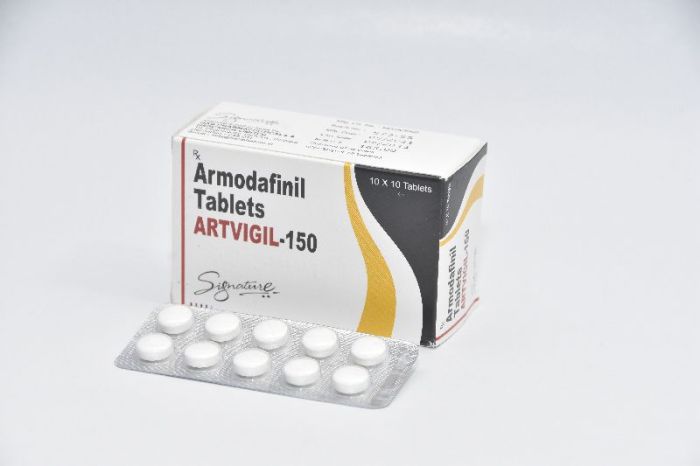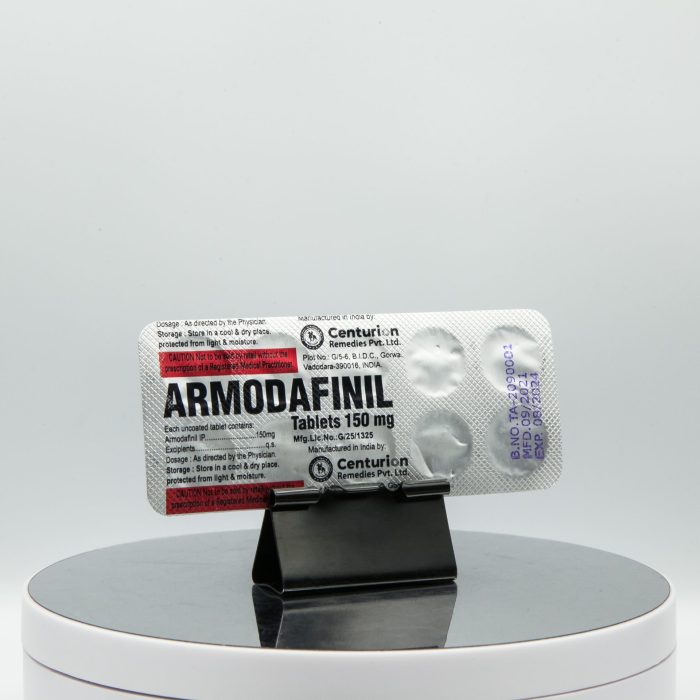Armodafinil is a medication primarily used to treat excessive sleepiness caused by conditions like narcolepsy, shift work sleep disorder, and obstructive sleep apnea. It acts on the brain to promote wakefulness and alertness, offering a potential solution for individuals struggling with these sleep-related challenges.
This medication belongs to a class of drugs known as eugeroics, which are specifically designed to enhance wakefulness. Armodafinil works by increasing the levels of certain neurotransmitters in the brain, including dopamine and histamine, which are associated with alertness and wakefulness. This mechanism of action distinguishes it from traditional stimulants, like amphetamines, which can have more pronounced side effects.
Armodafinil

Armodafinil is a prescription medication that promotes wakefulness and is used to treat excessive sleepiness associated with conditions like narcolepsy, shift work sleep disorder, and obstructive sleep apnea. It is a eugeroic, a type of stimulant that helps to increase alertness and reduce daytime sleepiness.
Chemical Structure and Relationship to Modafinil
Armodafinil is an enantiomer of Modafinil, meaning it is a mirror image of the Modafinil molecule. Both drugs share the same chemical formula (C15H15NO2S), but their atoms are arranged differently, resulting in distinct properties.
Armodafinil is the (R)-enantiomer, while Modafinil is a racemic mixture containing both the (R)- and (S)-enantiomers. The (R)-enantiomer is believed to be responsible for the majority of Modafinil’s wakefulness-promoting effects. Therefore, Armodafinil, being a pure (R)-enantiomer, is expected to have a more potent and longer-lasting effect compared to Modafinil.
Mechanism of Action
Armodafinil works by influencing the levels of certain neurotransmitters in the brain, particularly dopamine, norepinephrine, and histamine. These neurotransmitters play a crucial role in regulating wakefulness, alertness, and cognitive function.
Armodafinil’s exact mechanism of action is not fully understood, but it is believed to increase the release of these neurotransmitters or inhibit their reuptake, leading to an increase in their concentration in the brain.
This increase in neurotransmitter activity is thought to contribute to Armodafinil’s wakefulness-promoting effects.
Therapeutic Uses of Armodafinil
Armodafinil is a wakefulness-promoting medication that is primarily used to treat excessive daytime sleepiness associated with various sleep disorders. Its mechanism of action involves increasing dopamine and norepinephrine levels in the brain, which helps to promote wakefulness and improve alertness.
Approved Uses
Armodafinil is approved by the Food and Drug Administration (FDA) for the treatment of several conditions, including:
- Narcolepsy: Narcolepsy is a chronic neurological disorder characterized by excessive daytime sleepiness, cataplexy (sudden loss of muscle control), sleep paralysis, and hypnagogic hallucinations. Armodafinil is effective in reducing daytime sleepiness and improving wakefulness in individuals with narcolepsy. A study published in the journal *Sleep* found that armodafinil significantly improved daytime sleepiness and cataplexy symptoms in patients with narcolepsy compared to placebo.
- Shift Work Sleep Disorder: Shift work sleep disorder (SWSD) is a sleep disorder that occurs when individuals work rotating shifts or night shifts, disrupting their natural sleep-wake cycle. Armodafinil is effective in improving alertness and reducing daytime sleepiness in individuals with SWSD. A study published in the *Journal of Clinical Sleep Medicine* found that armodafinil significantly improved alertness and cognitive performance in shift workers compared to placebo.
- Obstructive Sleep Apnea: Obstructive sleep apnea (OSA) is a sleep disorder characterized by repeated episodes of upper airway obstruction during sleep, leading to pauses in breathing. Armodafinil is not approved for the treatment of OSA, but it may be used off-label to improve daytime sleepiness in individuals with OSA. A study published in the journal *Chest* found that armodafinil improved daytime sleepiness and alertness in individuals with OSA, although further research is needed to confirm its efficacy.
Potential Off-Label Uses
Armodafinil is also being investigated for its potential off-label uses, including:
- Improving Alertness and Cognitive Function: Armodafinil has been shown to improve alertness and cognitive function in healthy individuals, including tasks such as attention, memory, and reaction time. This has led to its use in various settings, such as military personnel, students, and individuals with attention-deficit/hyperactivity disorder (ADHD).
- Treating Depression: Some studies suggest that armodafinil may have antidepressant effects, particularly in individuals with treatment-resistant depression. However, further research is needed to confirm its efficacy and safety for this indication.
- Treating Alzheimer’s Disease: Armodafinil is being investigated for its potential to improve cognitive function and reduce symptoms in individuals with Alzheimer’s disease. Early research suggests that armodafinil may improve memory and attention in individuals with mild to moderate Alzheimer’s disease, but more studies are needed to confirm its effectiveness.
Side Effects and Safety

Armodafinil, like all medications, can cause side effects. While most individuals tolerate it well, some may experience adverse reactions. It’s essential to understand the potential side effects and take precautions to minimize risks.
Common Side Effects
Common side effects of Armodafinil are usually mild and tend to resolve on their own over time. These include:
- Headache
- Nausea
- Insomnia
- Dry mouth
- Dizziness
- Anxiety
- Diarrhea
- Indigestion
Serious Adverse Effects
While less common, Armodafinil can also cause more serious side effects, which may require medical attention. These include:
- Cardiovascular Issues: Armodafinil can increase heart rate and blood pressure. It’s crucial for individuals with pre-existing cardiovascular conditions to discuss the risks with their doctor before taking Armodafinil.
- Psychiatric Problems: Armodafinil can exacerbate pre-existing mental health conditions like anxiety, depression, and psychosis. It’s essential to monitor for changes in mood and behavior and seek medical advice if needed.
- Skin Reactions: In rare cases, Armodafinil can cause severe skin reactions, such as Stevens-Johnson syndrome and toxic epidermal necrolysis. These reactions can be life-threatening and require immediate medical attention.
- Liver Problems: Armodafinil can cause liver damage in some individuals. It’s important to monitor liver function tests regularly, especially if you have a history of liver problems.
Monitoring for Side Effects, Armodafinil
It’s essential to be aware of the potential side effects of Armodafinil and monitor yourself for any changes in your health. If you experience any concerning side effects, it’s crucial to contact your doctor immediately.
Seeking Medical Advice
If you experience any severe or persistent side effects, it’s essential to seek medical advice immediately. Your doctor can assess the situation, adjust your dosage, or recommend alternative treatments if necessary.
Armodafinil vs. Modafinil
Armodafinil and modafinil are both wakefulness-promoting medications used to treat excessive sleepiness associated with narcolepsy, shift work sleep disorder, and obstructive sleep apnea. They are both classified as eugeroics, meaning they promote wakefulness and alertness. While they share similarities, there are also key differences between these two drugs.
Chemical Structure and Mechanism of Action
Armodafinil is the R-enantiomer of modafinil, meaning it is a mirror image of modafinil. The two drugs have the same chemical formula but differ in their three-dimensional structure. This difference in structure leads to slight variations in their pharmacokinetic properties and their effects on the body. Both Armodafinil and modafinil work by increasing the levels of dopamine, norepinephrine, and histamine in the brain. These neurotransmitters play a crucial role in regulating wakefulness and alertness.
Efficacy
Several studies have compared the efficacy of armodafinil and modafinil in treating excessive sleepiness. Overall, armodafinil has been found to be more effective than modafinil in improving wakefulness and reducing daytime sleepiness. This is likely due to its longer duration of action and higher bioavailability.
Duration of Action
Armodafinil has a longer duration of action than modafinil. This is because armodafinil is metabolized more slowly, leading to a more sustained increase in wakefulness. The duration of action of armodafinil is typically 12-15 hours, while the duration of action of modafinil is typically 8-10 hours.
Side Effects
The side effects of armodafinil and modafinil are generally similar. The most common side effects include headache, nausea, dry mouth, and anxiety. However, some studies have suggested that armodafinil may be associated with a lower incidence of certain side effects, such as insomnia and dizziness.
Factors Influencing the Choice of Medication
The choice between armodafinil and modafinil depends on several factors, including:
- Severity of sleepiness: For patients with severe sleepiness, armodafinil may be a better choice due to its longer duration of action and higher efficacy.
- Duration of action: Patients who require longer-lasting wakefulness may benefit from armodafinil.
- Side effect profile: Some patients may experience fewer side effects with armodafinil than with modafinil.
- Cost: Armodafinil is typically more expensive than modafinil.
- Patient preference: Ultimately, the choice of medication should be based on the patient’s individual needs and preferences.
Armodafinil and Cognitive Enhancement
Armodafinil, a wakefulness-promoting drug, has gained attention for its potential to enhance cognitive function in healthy individuals. While primarily prescribed for conditions like narcolepsy and shift-work sleep disorder, research suggests that Armodafinil may improve various cognitive domains, including attention, memory, and executive function. However, the ethical implications of using Armodafinil for cognitive enhancement purposes remain a subject of debate.
Research Findings on Armodafinil’s Effects on Cognitive Function
Numerous studies have explored the effects of Armodafinil on cognitive performance in healthy individuals. These studies have yielded mixed results, with some demonstrating improvements in specific cognitive domains while others showing no significant effects.
- Attention: Some research suggests that Armodafinil can enhance attention, particularly sustained attention, which involves maintaining focus over extended periods. For instance, a study published in the journal “Psychopharmacology” found that Armodafinil improved sustained attention in healthy volunteers performing a task requiring sustained vigilance.
- Memory: Studies have also investigated the impact of Armodafinil on memory function. While some research has shown improvements in working memory, which involves holding information in mind for short periods, other studies have reported no significant effects on memory performance. Further research is needed to clarify the precise effects of Armodafinil on different types of memory.
- Executive Function: Executive function refers to higher-level cognitive processes such as planning, decision-making, and problem-solving. Some studies suggest that Armodafinil may enhance executive function, particularly in tasks requiring cognitive flexibility and planning. For example, a study published in the journal “Neuropsychopharmacology” found that Armodafinil improved performance on a task measuring cognitive flexibility in healthy volunteers.
Ethical Implications of Using Armodafinil for Cognitive Enhancement
The potential use of Armodafinil for cognitive enhancement in healthy individuals raises several ethical concerns.
- Fairness and Access: One concern is the potential for unequal access to cognitive enhancement technologies. If Armodafinil becomes widely used for cognitive enhancement, individuals with the means to obtain it could gain an unfair advantage over those who cannot afford it. This could exacerbate existing social inequalities and create a two-tiered society.
- Coercion and Pressure: There is also a concern that individuals may feel pressured to use cognitive enhancers, either from societal expectations or from employers who may demand enhanced cognitive performance. This could lead to a culture of coercion and pressure, where individuals feel obligated to use cognitive enhancers to remain competitive.
- Unforeseen Consequences: Another ethical concern is the potential for unforeseen consequences of widespread cognitive enhancement. While Armodafinil may enhance cognitive function in the short term, long-term effects on brain health and development are not fully understood. There is a risk that widespread use of cognitive enhancers could have unintended consequences for individual and societal well-being.
Future Research and Applications

Armodafinil’s potential extends beyond its current therapeutic uses. Ongoing research explores its efficacy in treating other conditions and investigates the development of improved formulations.
Exploring New Therapeutic Applications
Researchers are actively investigating Armodafinil’s potential in treating various conditions, including:
- Shift Work Sleep Disorder (SWSD): Studies are examining Armodafinil’s effectiveness in managing the sleep disturbances associated with shift work, potentially improving alertness and reducing fatigue.
- Narcolepsy: While Armodafinil is already approved for narcolepsy, research is exploring its use in combination with other treatments to optimize symptom management.
- Attention-Deficit/Hyperactivity Disorder (ADHD): Some studies suggest Armodafinil may improve attention and focus in individuals with ADHD, but further research is needed to determine its long-term safety and efficacy.
- Major Depressive Disorder: Preliminary studies indicate that Armodafinil might have antidepressant effects, potentially by increasing dopamine and norepinephrine levels in the brain. However, more research is required to confirm these findings and establish its role in treating depression.
- Cognitive Decline in Neurodegenerative Diseases: Researchers are investigating Armodafinil’s potential to enhance cognitive function and slow the progression of neurodegenerative diseases like Alzheimer’s disease and Parkinson’s disease. While promising, further research is needed to understand its long-term effects in these complex conditions.
Developing Novel Compounds
The development of novel compounds with similar properties to Armodafinil but fewer side effects is a promising area of research. These efforts aim to:
- Improve Selectivity: Researchers are developing compounds that target specific brain receptors responsible for wakefulness, potentially reducing side effects associated with non-specific actions.
- Enhance Pharmacokinetic Properties: Efforts are underway to create compounds with improved absorption, distribution, metabolism, and excretion characteristics, leading to more predictable and effective treatment regimens.
- Reduce Drug Interactions: Scientists are working to develop compounds with fewer drug interactions, minimizing the risk of adverse effects when combined with other medications.
Armodafinil holds significant potential for improving wakefulness and cognitive function in various conditions, but it’s essential to remember that it’s a prescription medication. Understanding its uses, side effects, and potential risks is crucial before considering its use. If you’re experiencing excessive sleepiness or have concerns about your sleep patterns, consulting a healthcare professional is the best way to determine if armodafinil is an appropriate treatment option for you.
Armodafinil is a wakefulness-promoting agent that helps improve alertness and focus. While it primarily targets sleep disorders, it’s also sometimes used off-label for other conditions like ADHD. Interestingly, the drug dolutegravir , a powerful antiretroviral medication, has also been found to have potential cognitive benefits, including enhanced attention and working memory. This shared effect suggests that understanding the mechanisms behind these drugs could lead to new treatments for cognitive impairments.